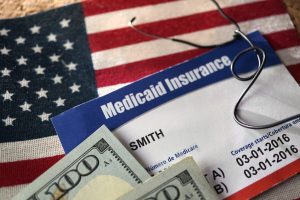Medicaid, the Uninsured and a Budget Shortfall
West Virginia has removed 118,000 residents from Medicaid and the Children’s Health Insurance Program (CHIP) since its eligibility review began this spring. That is quite a stunning number of people impacted — about 13,000 West Virginians are losing their health care coverage every month. They are our friends, neighbors, and family.
Unfortunately, many of these are procedural errors that the state is working hard to fix. These are real hard consequences.
Medicaid has always played a vital role as an insurer for low-income families in the Mountain State — particularly kids. Medicaid and CHIP are integral to our health care system, and it insures nearly half of West Virginia’s kids. According to the Kaiser Family Foundation, 47.1 percent of West Virginia’s kids qualify for Medicaid and CHIP. The national average is 39 percent.
However, as we head into the 2024 legislative session, the increasing number of uninsured West Virginians isn’t the only problem we’re facing.
Recent reports indicate that some states are beginning to consider cuts to their Medicaid program as they face budget deficits — and according to West Virginia’s commissioner for the Bureau of Medicaid Services, Cindy Beane, the Mountain State is facing a budget deficit of $114 million in the next budget year.
The pandemic triggered increased financing, grants and policy flexibilities that West Virginia has utilized to fight the direct and indirect impacts of COVID-19, and that has resulted in many more of our friends and neighbors accessing Medicaid. The additional funds triggered by the COVID-19 pandemic have only increased the overall economic benefits of Medicaid.
It’s important to remember that Medicaid is a federal-state financial partnership, under which the federal government picks up a fixed percentage of states’ Medicaid costs by “matching” state Medicaid funds with federal funding. This means that for every $1 cut in its Medicaid spending a state makes to help close its budget deficit, it also loses federal funding as well. As a result, the actual total cut to a state’s Medicaid program is significantly larger and its harmful impact would be greater.
In addition, the 80% federal support goes back down to about 75%.
According to Georgetown University’s School of Public Policy, the negative effect of Medicaid cuts on the state’s economy could also be considerably larger, which would both deepen and prolong the economic downturn, lead to bigger and continued state budget deficits, and necessitate further damaging Medicaid cuts.
Such cuts, for example, could include slashing Medicaid reimbursement rates to hospitals, physicians, nursing homes and other providers. In turn, that would significantly reduce access to needed care if providers are unable to continue to furnish the same level of services to Medicaid beneficiaries, no longer take Medicaid beneficiaries or cease operations entirely.
Translation: Fewer dollars mean fewer resources for low-income families, people with disabilities, pregnant women, and others who rely on Medicaid for health coverage. The state’s going to lose funding for all those people who have been dropped. Even though these poorer states spend less per resident on Medicaid, their federal reimbursement rate is relatively high, and so the impact of federal cuts is large.
Medicaid is essential to West Virginians and is a necessity to the state’s economic and health outcomes, and all the data currently available proves that the benefits associated with an investment in community health are vast.
The cruel nature of the economic downturn is that at a time when you need a social safety net is also the time when government revenues shrink.
If you or a family member has been removed from Medicaid or is without health insurance, help could be just a phone call away.
People can start the Medicaid renewal process online through the state’s PATH portal, by phone at 877-716-1212 or in person at local Department of Health and Human Resources field offices.
West Virginians looking for health coverage can contact WV Navigator for free assistance by calling 844-WV-CARES.

